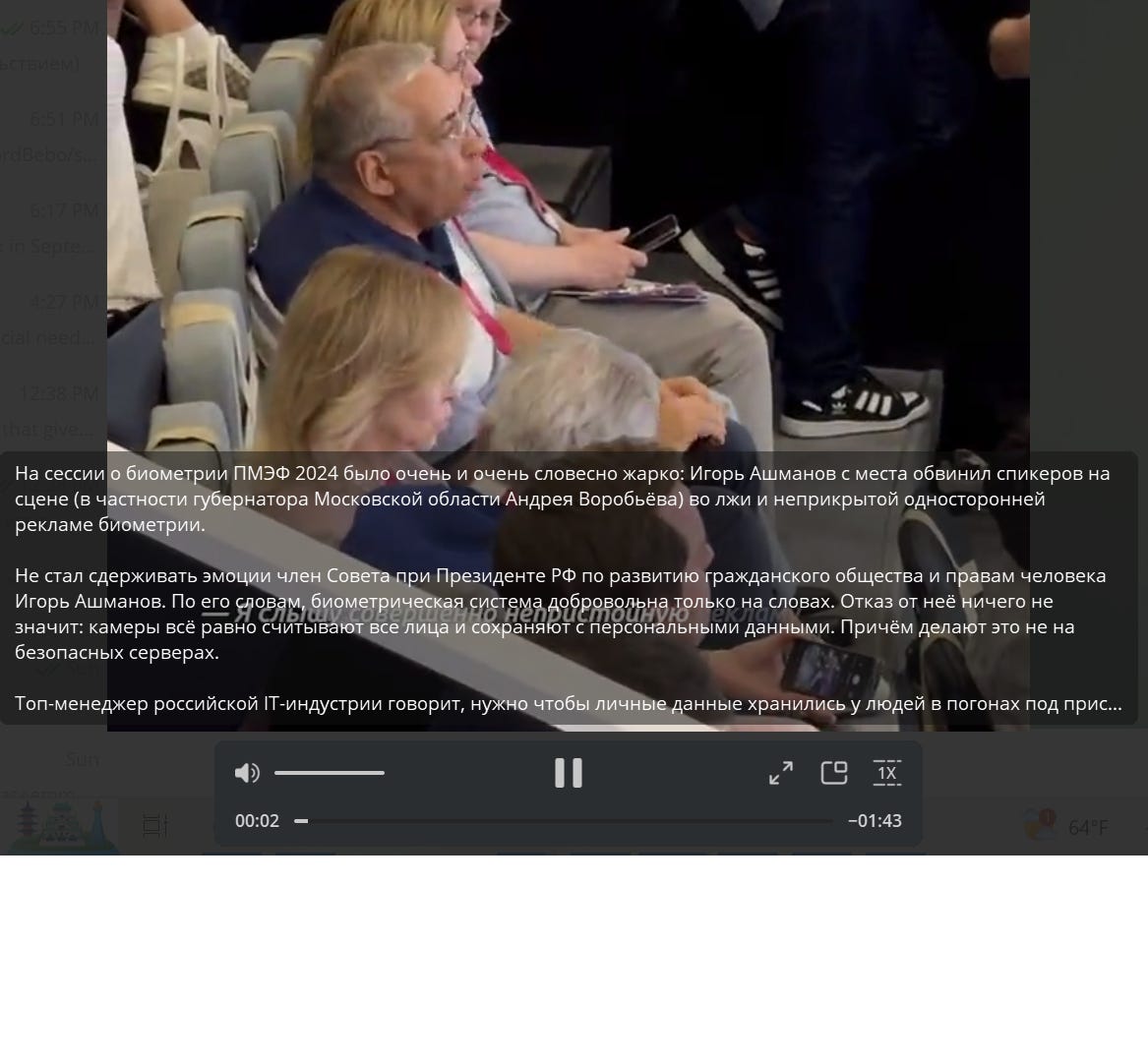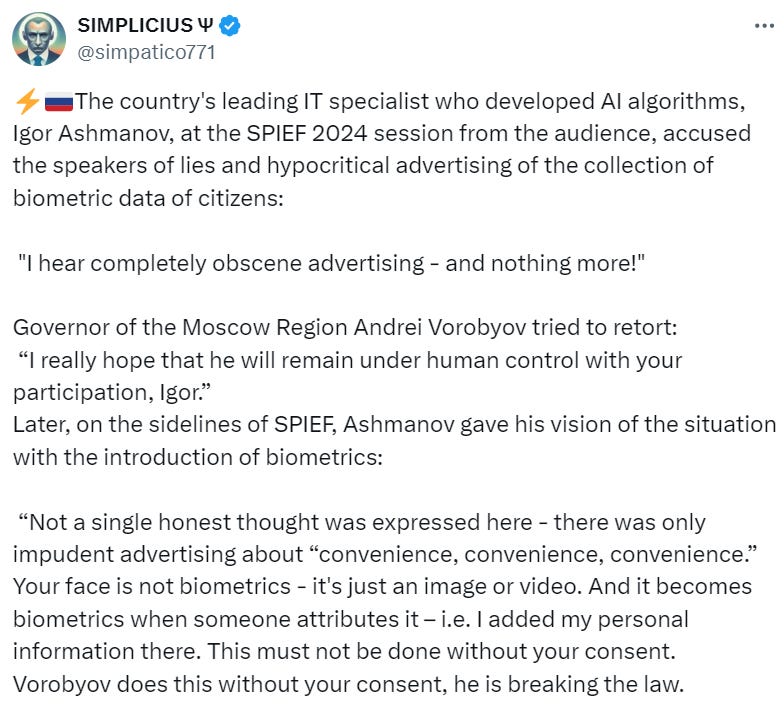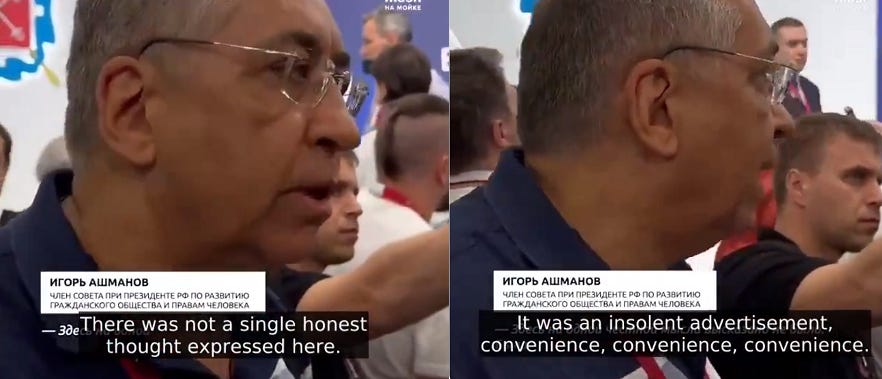There are a lot of misconceptions about Russia that I encounter on a regular basis. There are, of course, the ones from the establishment about Russia being an autocratic backwards aggressor country. But I also encounter many of a different kind.
For example, I’ve had to explain to several conservative members of my family that Russian conservatism is rather different than American conservatism and if they think they’re going to move to the Russian countryside and enjoy minimal government and have lots of guns, they best think again.
There is also the anti-establishment civil libertarian types who think that the Russian government is some kind of warrior against the WEF-influenced biometric, “cattle-tag” digital id, and vaccine mandate agenda.
Um, no.
While many average Russians do not like or want this, the Russian government largely seems to be ramming it down their throats, as Russian media and sources attest. Neoliberal technocrats still have a lot of sway in the Putin government.
But many people would still rather believe goofy western commentators who are projecting their idealistic fantasies onto Russia. – Natylie
Riley Waggaman, Substack, 6/10/24
As expected, the St. Petersburg International Economic Forum was the hottest anti-globalist multipolar traditional RETVRN values conference of 2024—possibly of all-time.
The unipolar world suffered non-stop humiliations during this mind-blowing freedom event. For example, Moscow Region governor Andrei Vorobyov made an incredible BRICS announcement during a titillating panel discussion about the joys of biometrics, causing the dollar to lose 50% of its value against the gold-backed ruble:
Biometrics is a tool that gives people better quality and more convenience in certain procedures, keeping them neat and tidy. You don’t need any papers or passports—that will all be in the past. Resisting it, in my opinion, is absurd.
The governor of Russia’s second-most-populated region, explaining the inevitable convenience of biometrics—which will replace archaic “papers” and “passports”.
Nothing is being hidden. They’re speaking very frankly. It’s all out there, in the open.
There is even a helpful “recap” of the panel discussion published by SPIEF. Behold the “highlights”:

“I am for biometrics … Everything I do is based on biometrics, everything is based on fingerprints, because I’m too lazy to carry cards with me and it’s much more convenient to just [login in/pass/go] through my face,” pontificated an expert panelist.
Was the BRICS Multipolar Happy Order incapable of finding a single panelist who had reservations about turning eyeballs into IDs? Igor Ashmanov, a member of the Presidential Council for the Development of Civil Society and Human Rights, had to shout his objections from the bleachers because they wouldn’t let his dirty anti-biometric ideas onstage:

Friend of the blog Simplicius posted a Twitter-summary of Igor’s very rude unipolar objections to biometrics:


“Yes, but Russians like biometrics, the most convenient of all forms for identification, which will replace ‘papers’ and ‘passports’,” you might be saying to yourself for some weird and tragic reason.
Take the wheel, nakanune.ru:
People in Russia are narrow-minded and have not yet realized how beautiful, convenient and progressive biometrics are. Therefore, whether they want it or not, the authorities will introduce it wherever possible. Approximately the same reasoning (without these words, but with this meaning) was heard at SPIEF in the section devoted to biometrics. Nakanune.RU provides characteristic statements about the attitude of business towards people.
At first, the presenter of the Russia 24 channel, Maria Kudryavtseva, advertised biometrics, showing how she enters the Unified Biometric System using her face and even the greeting “Hello, Maria!” appears there, which she enthusiastically shows to the audience.
At the same time, there was a feeling of a white gentleman showing “digital beads” to the local natives. And the whole “discussion” came down to one thing—intrusive advertising. It is characteristic that the governor of the Moscow region Andrei Vorobyov, who is a public servant, but showed himself to be a business lobbyist, was also involved in this.
As with artificial intelligence in healthcare , the panel included only proponents of biometrics. Those who might object were simply not invited. Those present were mainly engaged in advertising. Old people do not understand the digital world, but young people were already born with a gadget in their hand, they are very flexible, progressive, digital. They understand how convenient, cool and fast it is. In general, the conversation became very revealing in its vacuity and disregard for the position of citizens.
The first question to the speakers was provocative: is society ready to use biometrics? That is, don’t people want it, does the country need it, not what it will give, not what the risks are—but is society ready, as if the issue has been fundamentally resolved. Which is obscene. Let us recall that according to a 2023 survey , a third of Russians have a positive attitude towards taking biometrics, but almost half are opposed—48%.
[…]
Vorobiev spoke as if he had gone back in time a hundred years ago and was telling backward people of the past about the wonders of the technology of the future. Here are just a few quotes.
“You don’t need a paper or a passport, all this will be a thing of the past, it’s absurd to resist it. We all already use biometrics, including children at school… It’s convenient, you don’t need to twist anything, you just look and that’s it,” said Vorobiev. […]
It is characteristic that one of the main experts in the field of artificial intelligence in the country, a member of the Human Rights Council, Igor Ashmanov, was not invited to the section, who was forced to make remarks from the audience several times, and the section participants politely drew attention to the fact that someone might disagree. So, when Lebedev said that all people are for biometrics, he objected that this was not true. And when they started talking about different points of view, he very briefly but accurately described what was happening.
“You haven’t invited anyone to the presidium, you’re all blowing the same tune! As a member of the Presidential Human Rights Council, I hear completely obscene advertising, and nothing more!” said Ashmanov.
Good piece. It is challenging, in the midst of having to resist NATO lies about the origins of its proxy war with Russia over Ukraine, to also deal with the more futuristic problems that relate to Russian capitalist neoliberalism and the uncritical presumptions of the professional classes – despite the limitations of Western ‘advanced’ weapons systems and evidence of Western inability even to think things through
– that West is Best.
Spot on in your introduction. Your book on Russia should be required reading for any potential immigrant. I’ve seen a few Mormon immigrants to Russia posting YouTube videos, and I can’t wait to hear about what happens when they run into the old Mormon Church of Eastern Russia, which turned into one of the most violent crime families in that part of Russia. Live and let live, hardly. After my experiences traveling in Russia, I let the Episcopal Church (of Hong Kong) become the funnel for the small charity I did for the unemployed, starving university professors in the liberal arts sections. I admire much about Russia, but I prefer to admire it from a safe distance.
Tucker Carlson’s interview of Telegram founder might be a useful introduction for friends thinking of Russia as some place of unhindered freedom, as well as poking holes in the USA claims for same.